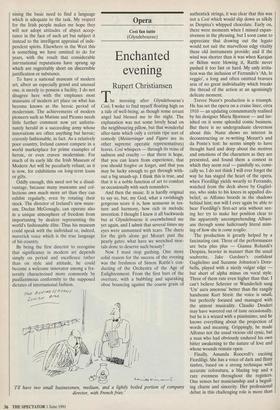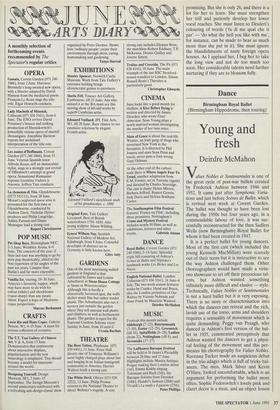Opera
Cosi fan tutte (Glyndebourne)
Enchanted evening
Rupert Christiansen
The morning after Glyndebourne's Cosi, I woke to find myself floating high on a tide of well-being, as though some errant angel had blessed me in the night. The explanation was not some lovely head on the neighbouring pillow, but that wonderful after-taste which only a certain ripe sort of comedy (Meistersinger and Figaro are its other supreme operatic representatives) leaves. Cosi whispers — through its veins of sadness and cruelty — that there is hope, that you can learn from experience, that you should forgive or forget, and that you may be lucky enough to get through with- out a big smash-up. I think this is true, and that it is a noble function of art to comfort us occasionally with such reminders.
And then the music. It is hardly original to say so, but, my God, what a ravishingly gorgeous score it is, how sensuous in tex- ture and harmony, how rich in melodic invention. I thought I knew it all backwards but at Glyndebourne it overwhelmed me yet again, and I admit that several times my eyes were unmanned with tears. The duets for the girls alone get Mozart past the pearly gates: what have we wretched mor- tals done to deserve such beauty?
Now I must stop gushing. One more solid reason for the success of the evening was the freshness of Simon Rattle's con- ducting of the Orchestra of the Age of Enlightenment. From the first bars of the overture, with a bubbling and squeaking oboe bouncing against the coarse grain of `I'll have two small businessmen, medium, and a lightly boiled portion of company director, with French fries.' authentick strings, it was clear that this was not a Cosi which would slip down as silkily as Despina's whipped chocolate. Early on, there were moments when I missed expan- siveness in the phrasing, but I soon came to appreciate that drawing out the legato would not suit the marvellous edgy vitality these old instruments provide; and if the wind was shorter than it was when Karajan or Biihm were blowing it, Rattle never pushed it too fast or hard. My only irrita- tion was the inclusion of Ferrando's `Ah, lo veggio', a long and often omitted bravura aria of no great individuality which breaks the thread of the action at an agonisingly delicate moment.
Trevor Nunn's production is a triumph. He has set the opera on a cruise liner, circa 1910 — an updating consummately realised by his designer Maria Bjornson — and lav- ished on it some splendid comic business. But there is no undergraduate cleverness about this. Nunn shows no interest in deconstructing or re-writing Mozart's and da Ponte's text: he seems simply to have thought hard and deep about the motives and emotions of the characters as they are presented, and found them a context in which they seem real — painfully so, comi- cally so. I do not think I will ever forget the way he has staged the heart of the opera, when Fiordiligi yields wearily to Ferrando, watched from the deck above by Gugliel- mo, who sinks to his knees in appalled dis- belief, as Alfonso broods in the shadows behind him; nor will I ever again be able to hear Fiordiligi's first-act aria without see- ing her try to make her position clear to the apparently uncomprehending Albani- ans through some ludicrously literal mim- ing of how she is come scoglio.
The production is greatly helped by a fascinating cast. Three of the performances are beta plus plus — Gianna Rolandi's Despina, heavier in manner than the usual soubrette, Jake Gardner's confident Guglielmo and Suzanne Johnston's Dora- bella, played with a nicely vulgar edge but short of alpha minus on vocal style. Three of them rate even higher than that. I can't believe Schreier or Wunderlich sang `Un' aura amorosa' better than the rangily handsome Kurt Streit: the voice is small, but perfectly focused and managed with the utmost musicality. Claudio Desderi may have wavered out of tune occasionally, but he is a wizard with a pianissimo, and he knows everything about the projection of words and meaning. Grippingly, he made Alfonso not the usual vicious old cynic, but a man who had obviously endured his own bitter awakening to the nature of love and whose wounds remain open.
Finally, Amanda Roocroft's exciting Fiordiligi. She has a voice of dark and flinty timbre, based on a strong technique with accurate coloratura, a blazing top and a rare evenness throughout the registers. One senses her musicianship and a beguil- ing charm and sincerity. Her professional debut in this challenging role is more than promising. But she is only 26, and there is a lot for her to learn. She must strengthen her trill and patiently develop her lower vocal reaches. She must listen to Desderi's colouring of words (la di me qual the ti par' — 'do what the hell you like with me', for instance, can be made to bear so much more than she put in it). She must ignore the blandishments of nasty foreign opera houses. As I applaud her, I beg her to take the long view and not do too much too soon. Her considerable talents need further nurturing if they are to blossom fully.



















































 Previous page
Previous page